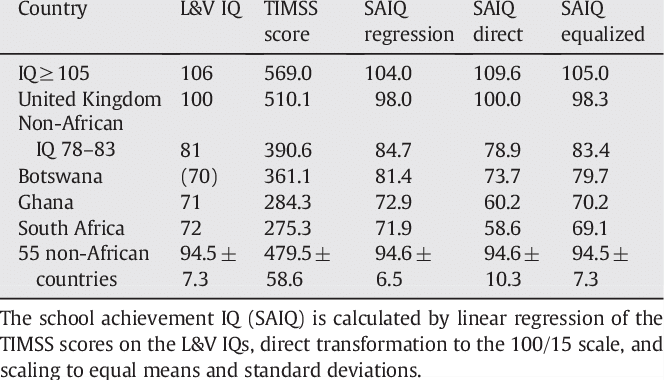Understanding IQ Metrics Across Nations: A Closer Look at Gambia, Ghana, and Nepal

The concept of intelligence, particularly when measured by IQ (Intelligence Quotient), has long been a subject of fascination and debate. Lists ranking countries by average IQ scores often circulate online, sometimes pointing to nations like Gambia, Ghana, and Nepal as having lower averages.
But what do these rankings really tell us? Are they a fair reflection of human potential, or do they oversimplify a far more complex reality? In this post, we’ll explore the factors behind these rankings, why they’re controversial, and what they might mean for countries like Gambia, Ghana, and Nepal.
The IQ Controversy: What Are We Measuring?IQ tests aim to measure cognitive abilities like problem-solving, reasoning, and memory. However, their application across diverse cultures and environments is fraught with challenges. Studies like those by Richard Lynn and others, which often inform global IQ rankings, rely on standardized tests that may not account for cultural differences, education access, or environmental factors. For example, a test designed in a Western context might not resonate with someone from a rural village in Nepal, where daily life demands different forms of intelligence, like spatial navigation or agricultural knowledge.Gambia, Ghana, and Nepal frequently appear in discussions about lower average IQ scores, often based on data from studies like Lynn’s.
These countries, with average IQs reportedly ranging from 60 to 70 (compared to a global mean of 100), are cited as examples of cognitive disparity. But these numbers don’t tell the whole story. Let’s unpack why.Contextual Factors: Why Scores Vary
- Education Access and Quality
In Gambia, only about 40% of children complete secondary education, according to UNESCO data. In Ghana, the figure is higher but still lags behind global averages. Nepal faces similar challenges, with mountainous terrain making school access difficult for many. IQ tests often measure skills honed through formal education, like literacy and abstract reasoning. Limited schooling can depress scores, but this reflects opportunity gaps, not innate ability. - Nutrition and Health
Malnutrition, particularly in early childhood, can significantly impact cognitive development. In Gambia, nearly 25% of children under five face stunting due to poor nutrition, per World Bank reports. Ghana and Nepal also grapple with similar issues, though Ghana has made strides in reducing malnutrition. Health challenges like malaria or inadequate healthcare further complicate cognitive outcomes. - Cultural Bias in Testing
IQ tests often assume a universal standard of intelligence, but cognition is shaped by culture. In Nepal, for instance, oral traditions and community-based problem-solving are central to daily life, yet these skills aren’t captured by standard IQ metrics. Similarly, Ghana’s rich cultural heritage emphasizes social intelligence and storytelling, which may not translate to a test score. - Socioeconomic Challenges
Poverty limits access to resources that support cognitive development, like books, technology, or safe learning environments. In Gambia, with a GDP per capita of around $800, economic constraints are stark. Ghana and Nepal, while slightly better off, still face significant poverty rates. These realities shape cognitive outcomes far more than any inherent traits.
Gambia, Ghana, and Nepal: Beyond the NumbersFocusing solely on IQ scores risks overlooking the strengths and resilience of these nations:
- Gambia: Despite resource constraints, Gambia has a vibrant cultural scene and a growing tourism industry. Its people navigate complex social and economic challenges with ingenuity, a form of intelligence no test can measure.
- Ghana: Known for its stability and rapid development, Ghana has produced global leaders in fields like diplomacy (think Kofi Annan) and boasts a thriving tech sector. Cognitive diversity here fuels innovation.
- Nepal: Home to the Himalayas, Nepal’s people demonstrate remarkable adaptability to harsh environments. Their spiritual and communal intelligence, rooted in Buddhist and Hindu traditions, offers lessons in resilience.
The Bigger Picture: Rethinking IntelligenceRankings like “low IQ countries” can perpetuate harmful stereotypes if taken at face value. Intelligence is multifaceted, shaped by environment, culture, and opportunity. Gambia, Ghana, and Nepal, like all nations, have unique strengths that simplistic metrics fail to capture. Instead of focusing on deficits, we should celebrate the diverse ways humans solve problems and thrive.Global IQ studies can spark curiosity, but they demand context.
Investing in education, healthcare, and economic opportunities in countries like Gambia, Ghana, and Nepal would likely shift these metrics dramatically. More importantly, it would empower individuals to reach their full potential—whatever form that takes.ConclusionLists ranking countries by IQ may grab headlines, but they obscure more than they reveal.
Gambia, Ghana, and Nepal are not defined by test scores but by their people’s resilience, creativity, and potential. Intelligence is not a single number—it’s a tapestry woven from culture, environment, and opportunity. Let’s move beyond rankings and focus on building a world where everyone can shine.



